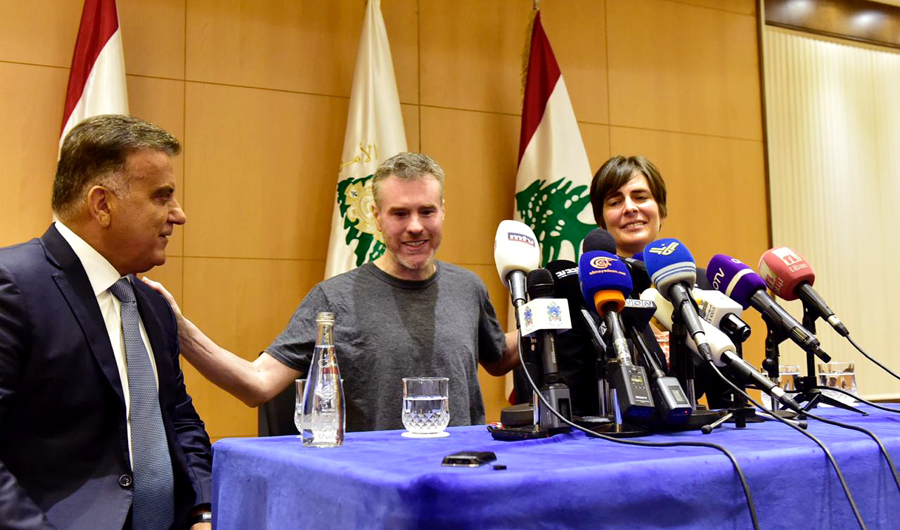BEIRUT: Canadian Kristian Lee Baxter, 44, who was detained for nine months in Syria, was released after Lebanese officials stepped in to ensure his freedom.
Baxter appeared at the General Security Headquarters in Beirut with the Canadian Ambassador to Lebanon Emmanuelle Lamoureux and the director-general of the Lebanese General Security Directorate, Maj. Gen. Abbas Ibrahim. Baxter appeared to be slender and highly emotional.
“The Syrian state has cooperated with us by releasing a former American hostage (journalist Austin Tice, who was held in Syria from 2012) and today a Canadian citizen,” said Ibrahim.
He added: “Baxter was detained in Syria last year for violating their laws, and I renew my thanks to the Syrian state for cooperation and shortening his detention.”
Ibrahim said his mediation with Syria was based on “the request of Canada, which asked Lebanon to intervene to release him. I informed President Michel Aoun and Prime Minister Saad Hariri on Thursday about the results of the process.”
Ibrahim said the successful release is “in Lebanon’s interest because it brings us back to the world map.”
Commenting on Lebanese journalist Samir Kassab and Archbishops John Ibrahim and Paul Yazji, who have been missing in Syria for years, Ibrahim said: “The issue is being followed up, but we have no information that we can announce at the moment.”
Ibrahim was asked about the sentence issued against Lebanese businessman Qassem Tajeddine, 63, in the US. “Things have become clear with the court ruling,” he said, adding that he had visited Tajeddine while he was on an official visit to the US and that “he was in difficult health conditions. I hope he has improved.”
On Thursday, a US court sentenced Tajeddine to five years in prison and a $50 million (SR185m) fine for circumventing sanctions imposed on him as a “significant financial contributor to Hezbollah,” according to the US Justice Department.
Lamoureux expressed her country’s gratitude to Ibrahim and the role he played in bringing Baxter to his family. “Today is a glorious day for Canadians,” she said.
The envoy declined to give any details of the negotiations or to comment on the case “because of Canada’s privacy laws.”
Baxter tried to speak to journalists, but he was lost for words: “I thought I would be there forever. I didn’t know if anyone knew if I was alive.”
He thanked the Canadian Embassy and the Lebanese authorities for their assistance in his release.
He looked very emotional and burst into tears. The Canadian ambassador also became emotional before she ended the press conference.
Baxter, who is from British Columbia, had gone to Syria “in search of adventure in a war-torn country,” according to the Canadian Press.
His mother, Andrea Leclair, said at the time that her son was a “world traveler, adventurer, history lover and uses a metal detector as a hobby, but he didn’t realize it was not allowed across the border.
“He told me he was meeting nice people and that he was offered food, tea and coffee everywhere he went. He was having a great time before he went missing,” she said.
Leclair added that she lost contact with her son on Dec. 1. He had arrived in Syria on Nov. 26 and was contacting her daily, but after she received the last message from him she discovered that “there was no Canadian Embassy operating in Syria.”
The Canadian government has warned its citizens not to travel to Syria since the war started in 2011. Canada severed diplomatic relations with the country in 2012 and closed its embassy.




